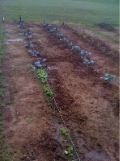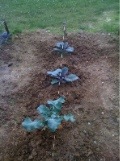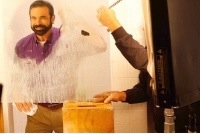 I've spent my career trying to understand consumers, their lifestyles, their needs and their passions. I've watched people play paintball, take showers, plant gardens and cook gourmet meals. I've traveled the world to understand how consumers in different cultures differ in their desires and preferences.
I've spent my career trying to understand consumers, their lifestyles, their needs and their passions. I've watched people play paintball, take showers, plant gardens and cook gourmet meals. I've traveled the world to understand how consumers in different cultures differ in their desires and preferences.
 But last week, I had a brand new experience. I spent 8 days in northern Haiti. Our charge was to capture video that could be used by a mission group to promote their ministry, solicit donations and encourage child sponsorships. Unlike past international trips, I didn't stay in a 5 star hotel and venture from my air conditioned cab into a recruited home.
But last week, I had a brand new experience. I spent 8 days in northern Haiti. Our charge was to capture video that could be used by a mission group to promote their ministry, solicit donations and encourage child sponsorships. Unlike past international trips, I didn't stay in a 5 star hotel and venture from my air conditioned cab into a recruited home.
 This was immersion. We worked side by side with locals, conducted interviews with people that had no clothing in villages that had neither electricity nor running water. We traveled in a taptap, essentially an open bed truck with a steel insert for passengers to hang onto.
This was immersion. We worked side by side with locals, conducted interviews with people that had no clothing in villages that had neither electricity nor running water. We traveled in a taptap, essentially an open bed truck with a steel insert for passengers to hang onto.
 Haiti is the poorest nation in the Western Hemisphere. Having spent a lot of time in India, I've seen poverty before, but never in such a beautiful setting. Haiti reminded me a lot of Hawaii, or of many of the other Caribbean islands, but with poverty spread all across it.
Haiti is the poorest nation in the Western Hemisphere. Having spent a lot of time in India, I've seen poverty before, but never in such a beautiful setting. Haiti reminded me a lot of Hawaii, or of many of the other Caribbean islands, but with poverty spread all across it.
 In spite of the poverty, I've never encountered a culture so warm and friendly as what the Haitians were. As we walked or rode around, children would run out to wave yelling "Hey Blanc, Hey Blanc" - translating to Hello White.
In spite of the poverty, I've never encountered a culture so warm and friendly as what the Haitians were. As we walked or rode around, children would run out to wave yelling "Hey Blanc, Hey Blanc" - translating to Hello White.
 It was both sad and beautiful at the same time. Seeing children with nothing that could laugh, smile and play with stones made me realize how spoiled our culture truly is. Our nation is in a panic because our 401k's have dropped in value. In Haiti, people wonder when they will eat again.
It was both sad and beautiful at the same time. Seeing children with nothing that could laugh, smile and play with stones made me realize how spoiled our culture truly is. Our nation is in a panic because our 401k's have dropped in value. In Haiti, people wonder when they will eat again.
 I spoke with a couple of civic leaders about the state of their nation. They made a comment to me that they truly appreciate what America has done for Haiti, and that the generosity of money has been considerable. However, if Haiti is to ever rise out of it's current state, it's time to do more than send money. It's time to send "teachers". People that can teach people how to farm, how to run a city, how to teach children, how to run a small business.
I spoke with a couple of civic leaders about the state of their nation. They made a comment to me that they truly appreciate what America has done for Haiti, and that the generosity of money has been considerable. However, if Haiti is to ever rise out of it's current state, it's time to do more than send money. It's time to send "teachers". People that can teach people how to farm, how to run a city, how to teach children, how to run a small business.
 It will only be through education that the economy will be able to turn around and begin to grow from it's current third-world status.
It will only be through education that the economy will be able to turn around and begin to grow from it's current third-world status.
 I know in my own life it's often easier to open the checkbook and write a check to a good cause than it is to commit my personal time and energy to something. But checks alone are not going to improve our world. This was my first trip of this nature. I've got a feeling, it won't be my last.
I know in my own life it's often easier to open the checkbook and write a check to a good cause than it is to commit my personal time and energy to something. But checks alone are not going to improve our world. This was my first trip of this nature. I've got a feeling, it won't be my last.








